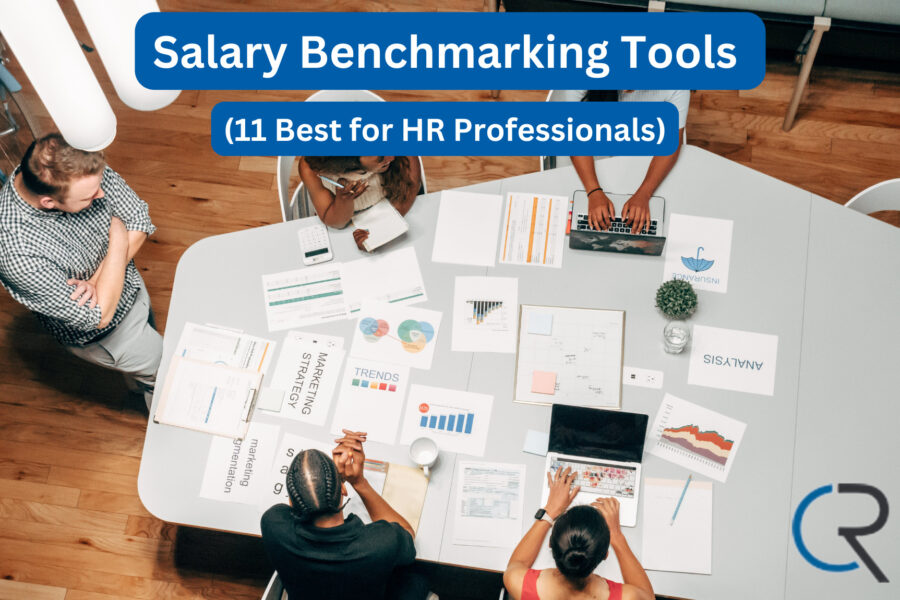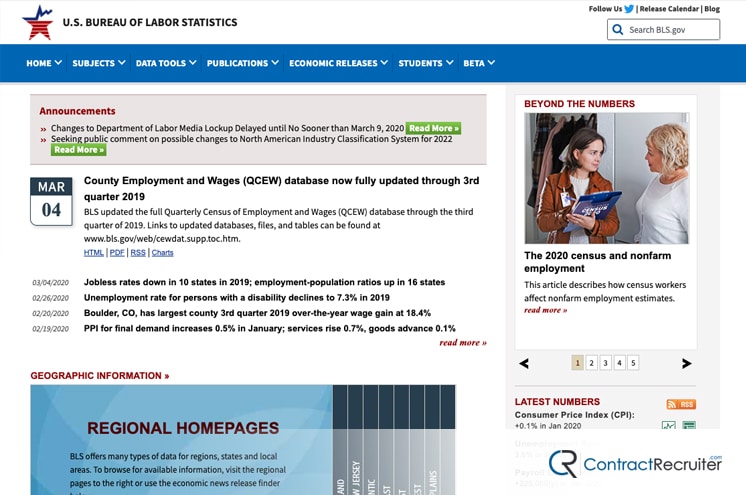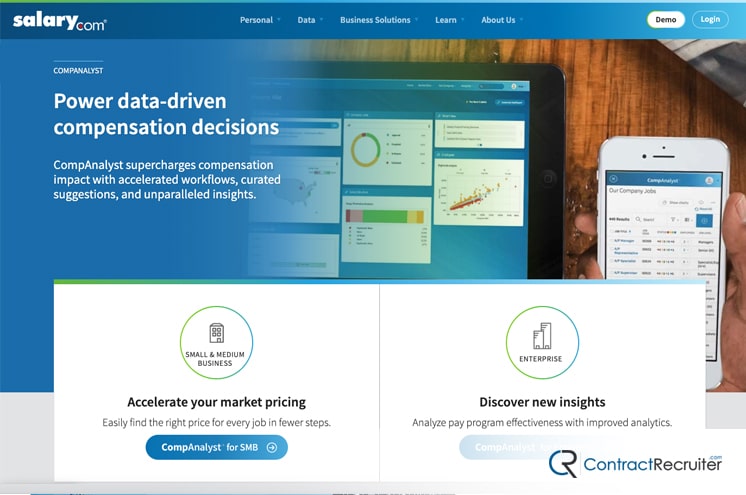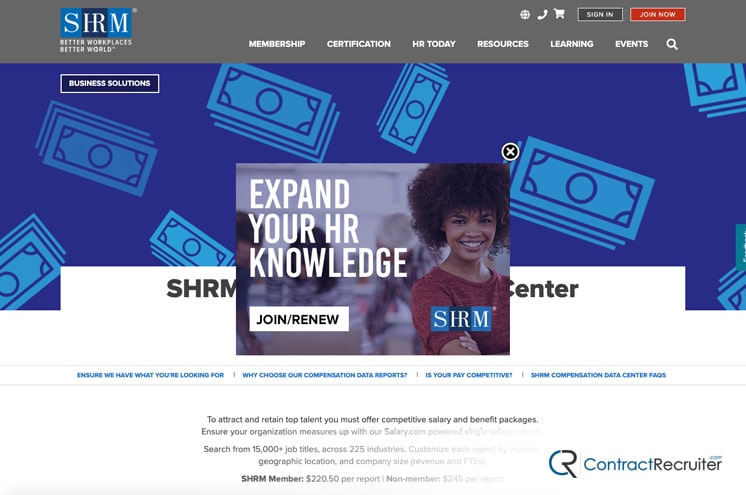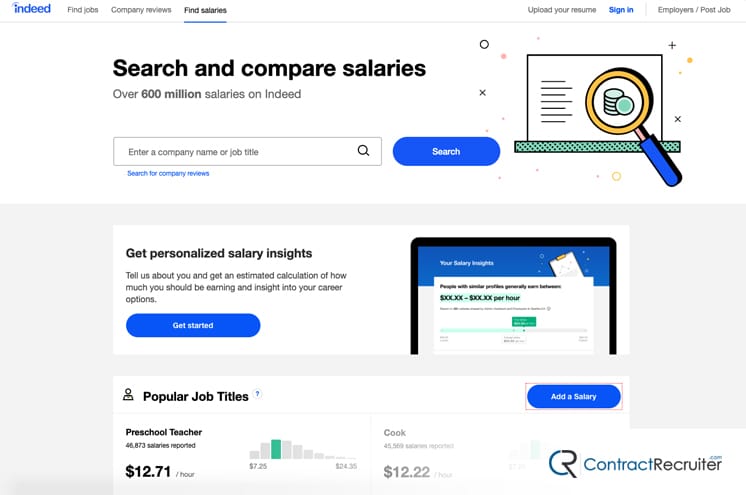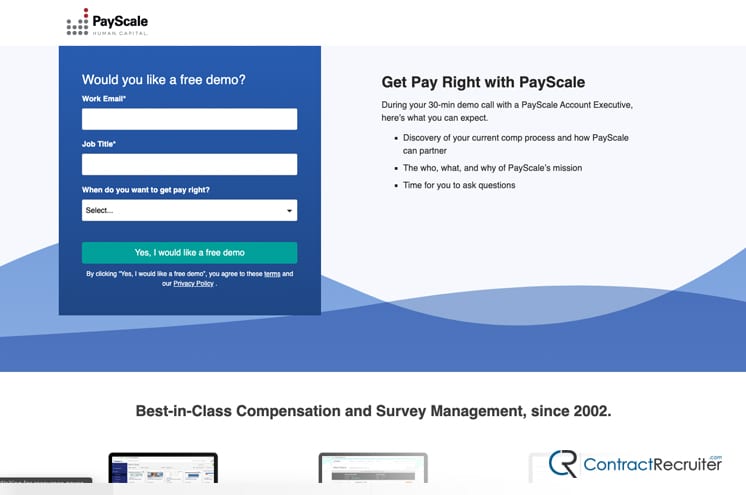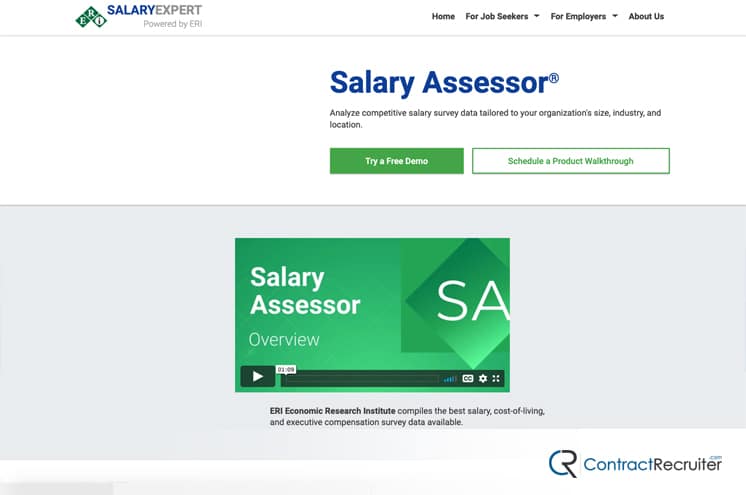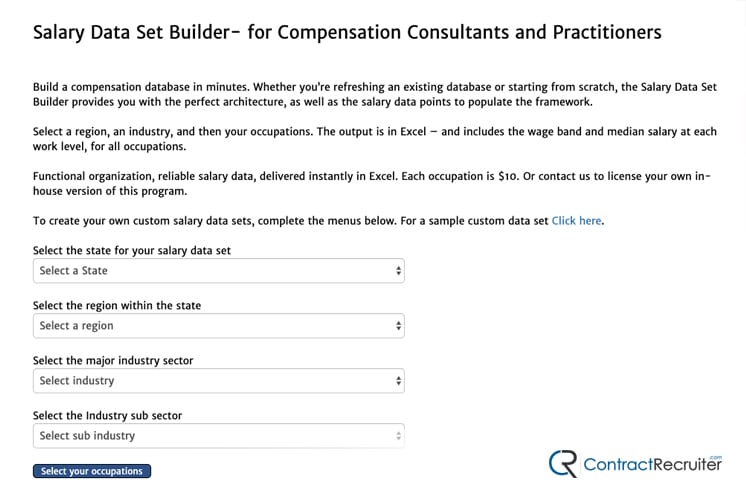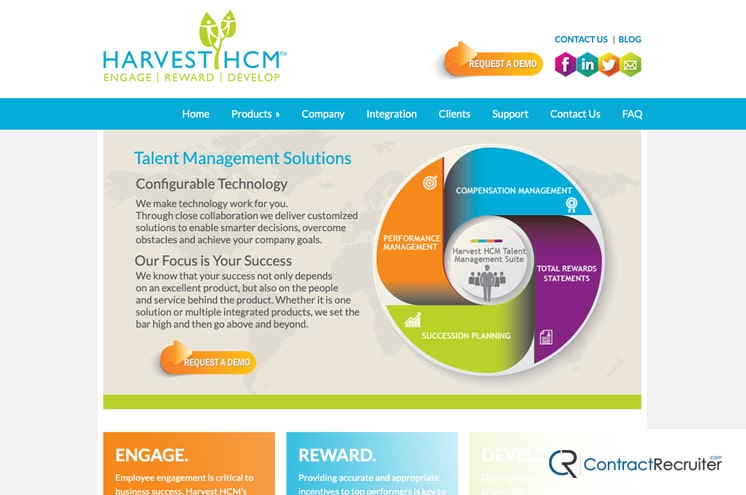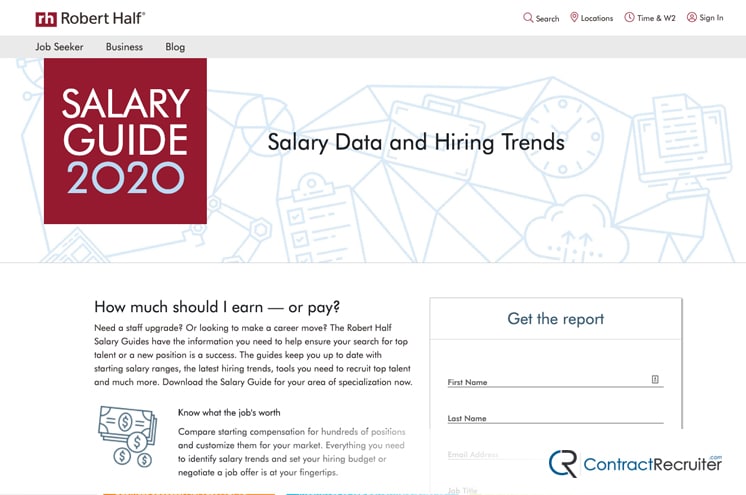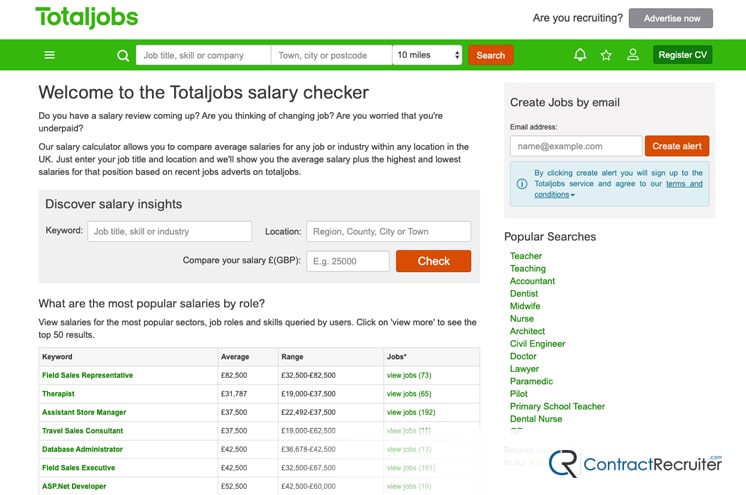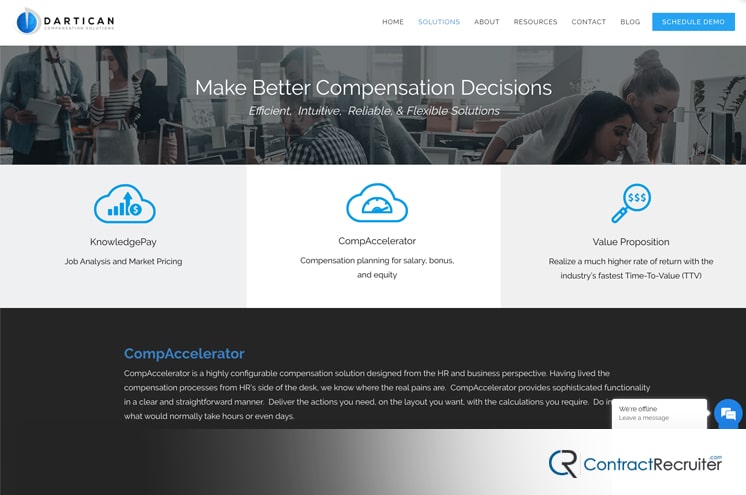A key part of attracting candidates to any role is establishing a reasonable salary for that role. A position that pays under the area salary average needs to have something very worthwhile to tip the scales, whether it’s great benefits, or something else. Conversely, a role that pays far above the average can be quite attractive for candidates, but less so for the company, and it can warn off a few savvy candidates who worry about why it pays so much. Does the company have trouble with retention or culture, and hopes their money will solve the problem?
Hiring managers and HR staff don’t have some golden book with salary information to pull from. We have to research salary information just as much as people looking for jobs. The difference is, we often have access to salary benchmarking tools to help perform that research. Tools such as the ones we’ve compiled below.
Remember that the people applying to a role will have an idea of the kind of salary they’re looking for. Some of them will use tools, including some of what we’ve listed below, to figure out average salaries. Others will talk to friends in the industry, coworkers at their current job, or other HR reps to learn how to negotiate.
Some companies try to hire people at unusually low salary rates and make discussing salary against office policies. Pay secrecy policies are usually illegal, though. The fact is, people will talk about money, and it’s important that you offer fair salary rates for your hires, new and old.
When you and your candidates are getting salary information from a similar set of tools, you both start on the same page. You can adjust the average salaries from there.
How can salaries adjust?
- Cost of living. A company paying software developers in Kansas City can pay them less than a company paying software developers in Seattle, a much more expensive city.
- Experience. The more experienced a candidate is, the higher the initial salary you can offer them – or they might demand.
- Benefits adjustments. A lower-than-average salary can still be competitive and acceptable if you offer benefits like 401k matching, work from home time, or high-quality healthcare.
Setting reasonable salary ranges before you enter negotiations from either side of the process is important. We’ve all had cases where a candidate has much higher expectations than we’re able to provide and vice versa.
So what tools can you use to research salaries? Here are our top 11 options.
1. The United States Bureau of Labor Statistics
A sub-department of the Department of Labor, the BLS is where all of the various employment and labor data sources are aggregated, analyzed, and presented to the public. Information can be found in raw form or in processed graphs, easy to read blog posts, and everything in between.
The BLS data helps with general salary information, but it also helps put that information into context. Other useful data for this includes regional employment data, job outlooks, employment trends, and even demographic information. All of this can be used (within reason) to make salary determinations for open positions you want to fill.
2. CompAnalyst by Salary.com
Salary.com is a public-facing website and app suite aimed largely at job seekers, to allow them to look up salary information for specific roles in a specific region. It allows job seekers to refine positions based on education, experience, performance, and other factors – it also has very granular information about specific roles.
CompAnalyst is the business-side platform of the same information. They have both an offering for small businesses and an enterprise-level platform with program compensation analysis. They boast over 800 million market data points to make compensation data both granular and accurate.
Salary Benchmarking Tool Honorable Mention: SHRM
One of the more popular recommendations we see for salary and compensation research is SHRM, which is a membership platform with tools, reports, data, and training for HR staff in any industry. They have access to a ton of great data and can generate custom reports, at $245 per report for non-members or $220.50 per report for members.
So why is it only an honorable mention rather than an item on this list? All of their data comes from Salary.com. You can get the same information and the same reports directly from CompAnalyst without having to pay for it through SHRM. Now, SHRM has a ton of added value and information available, so it’s far from worthless, but it’s still not a unique source of data.
3. Glassdoor
Glassdoor is typically considered a candidate-side tool because it’s part of the overall research pattern when looking for a new job. Individuals on the job hunt use it to research the reviews of specific businesses, looking for warning signs, hints of company culture, and so on. Glassdoor also has its own job board, tons of tips and information for interviews, and more.
For the business side, Glassdoor allows you to search the same data sets that your candidates will be searching for. You can see what others have posted about your company, including public salary information and reviews. You can also develop an idea for what level of compensation a candidate will be looking for, so you can develop a competitive offer.
4. Indeed
Indeed is good for many of the same reasons Glassdoor is good. The two companies evolved from different directions into very similar end results. Glassdoor started as a company review site and expanded to include salary information and job postings, while Indeed started with job postings and expanded to include company reviews and salary information.
You can use Indeed’s salary search to look up and compare salary information for a wide range of jobs, though they do have a slight bias. If your company isn’t likely to put a job posting up on Indeed, other similar companies might not either, which means Indeed might not have a lot of accurate salary information for them. Still, with over 600 million salary records to search through, they probably have enough to give you a decent range.
5. PayScale
PayScale started as a compensation analysis and management company in 2002, and has expanded to become one of the industry leaders in compensation data management in the decades since.
They have three different offerings as part of their overall platform. “MarketPay” is a survey engine aimed at compensation-related data harvesting, coupled with insights to allow a company to refine its salaries for both existing and new hires. “Insight Lab” is its strategy, management, and analytics platform that handles all of the data from surveys and other sources. “Team” is, as you might expect, a team-based platform to allow collaboration with multiple hiring managers and HR staff at once, so everyone is on the same page.
6. Salary Expert
Powered by the Economic Research Institute, Salary Expert has a handful of different offerings available. The most generally and broadly useful is Salary Assessor, a platform with competitive salary survey data you can tailor and customize to match your own industry, location, and company size.
Other versions of the platform include the Executive Compensation Assessor (aimed, as you might expect, at executives and C-levels), the Geographic Assessor to analyze variance between regions, the Global Salary Calculator, a Cost of Living Comparison tool for people looking to relocate, and more. Several of these tools are under the overall banner of the ERI, not just of Salary Expert, but they can all be accessed relatively easily, and data is updated daily.
7. JSI’s Data Reports
Educate to Career is the portal for Job Search Intelligence. The company is primarily focused on data aggregation for new college graduates and fresh-from-education job seekers, so it’s narrow in scope.
However, if your company is looking for data about that specific set of salary ranges, it’s an invaluable resource.
One of the biggest benefits of these data reports is their flexibility. You can pull data from their system manually using any of the searches available on the linked page, or you can access their API and pull data algorithmically as you need it. It’s also quite affordable, at only $25 for all of the data about a specific job title, which is cheaper than most platforms offering similar data.
8. Harvest HCM
Harvest HCM has a handful of different talent management tools, for different aspects of the hiring and management process. The one we’re looking at today is the compensation management tool, but they also have performance, succession, and rewards systems as well.
The Harvest compensation management platform is a system that helps maintain and manage all of your own compensation data, including bonuses, stock options, equity, variable pay programs, and more. It integrates with other apps you may already be using for financial systems, as well.
9. Robert Half
Robert Half is a company founded in 1948, specifically created for professional staffing and employment interests. Throughout the last half-century, they have evolved to keep up with modern trends and technology.
The Robert Half Salary Guide is a downloadable report they produce once a year, compiling employment and compensation data on a variety of industries. This salary guide can be downloaded for non-commercial use, but they also offer a salary calculator that makes use of that data on the back end to generate specific salary information on a job-by-job basis.
10. Total Jobs
The Total Jobs salary checker is a database with jobs and salary information, able to be sorted by job title, region, and industry. It pulls data from its own jobs network, which is actually somewhat limited. In fact, this isn’t a great resource for most people, but it’s excellent for some. Why?
Total Jobs is based in the UK. The salary information is all in pounds, the regional sorting is UK regions, and the data is limited to UK data. For those looking for compensation information in the UK, it’s an excellent resource. For anyone outside of the UK, it’s only useful if you’re looking to open a branch or otherwise move to the UK. It’s narrow, but it’s good for those who can use it, so we included it on the list.
11. Dartican
Dartican is a company focused on compensation-based HR software. They have three segments to their solutions; KnowledgePay, CompAccelerator, and Value Proposition.
KnowledgePay is a job analysis and market pricing research tool. This helps you develop an awareness of what particular roles are likely to offer throughout your industry and your region. CompAccelerator is a platform where you can take that information and plan a compensation package for potential new hires. This takes into account salary, bonuses, equity, and more. Value Proposition helps analyze shortcomings in your current compensation packages, to offer better value to employees while saving money on expenses.
Conclusion
In the competitive landscape of recruitment, salary benchmarking is not merely an HR task but a strategic tool that ensures a company’s offer is attractive and realistic. It’s the bridge between candidate expectations and company budget, balancing industry standards with organizational capabilities. The eleven tools we’ve highlighted offer a robust foundation for any HR professional to construct a fair and enticing compensation package, whether it’s by tapping into comprehensive databases like the BLS and Salary.com or leveraging tailored platforms like PayScale and Robert Half.
As you dive into the wealth of data these tools provide, remember that an informed salary decision is a powerful magnet for top talent. Embrace these tools to make data-driven salary decisions that reflect both the market’s pulse and your company’s unique offerings.
Whether you’re crafting a new role or revising existing pay scales, these resources are invaluable in securing the best talent while maintaining fiscal responsibility. Take the first step towards a more strategic salary approach and choose the right tools to empower your decisions.
Secure the future of your organization by investing in the right people. Contact us today and discover how you can enhance your hiring strategy to build the dream team that will lead your company to new heights.
Page updated on November 19, 2023.

